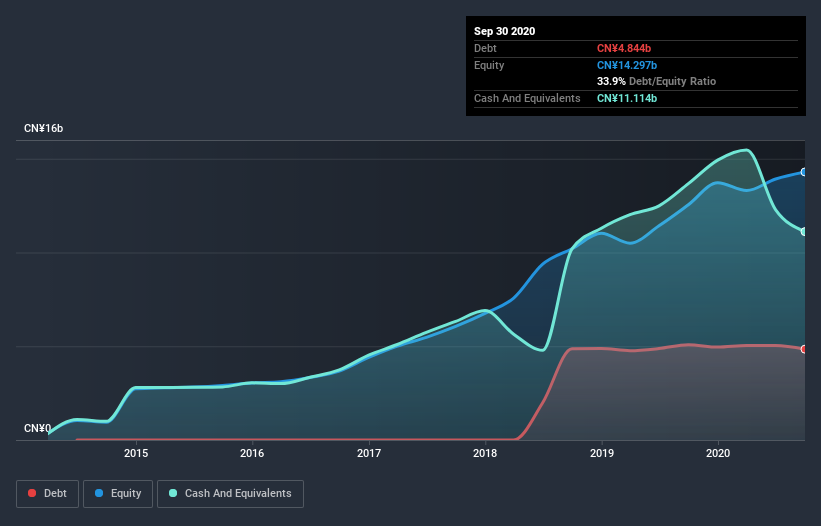- United States
- /
- Interactive Media and Services
- /
- NasdaqGS:MOMO
Is Momo (NASDAQ:MOMO) Using Too Much Debt?

Legendary fund manager Li Lu (who Charlie Munger backed) once said, 'The biggest investment risk is not the volatility of prices, but whether you will suffer a permanent loss of capital.' So it might be obvious that you need to consider debt, when you think about how risky any given stock is, because too much debt can sink a company. We note that Momo Inc. (NASDAQ:MOMO) does have debt on its balance sheet. But is this debt a concern to shareholders?
What Risk Does Debt Bring?
Debt and other liabilities become risky for a business when it cannot easily fulfill those obligations, either with free cash flow or by raising capital at an attractive price. If things get really bad, the lenders can take control of the business. While that is not too common, we often do see indebted companies permanently diluting shareholders because lenders force them to raise capital at a distressed price. By replacing dilution, though, debt can be an extremely good tool for businesses that need capital to invest in growth at high rates of return. The first thing to do when considering how much debt a business uses is to look at its cash and debt together.
See our latest analysis for Momo
How Much Debt Does Momo Carry?
You can click the graphic below for the historical numbers, but it shows that Momo had CN¥4.84b of debt in September 2020, down from CN¥5.08b, one year before. But it also has CN¥11.1b in cash to offset that, meaning it has CN¥6.27b net cash.

How Healthy Is Momo's Balance Sheet?
According to the last reported balance sheet, Momo had liabilities of CN¥2.50b due within 12 months, and liabilities of CN¥5.99b due beyond 12 months. Offsetting these obligations, it had cash of CN¥11.1b as well as receivables valued at CN¥233.4m due within 12 months. So it actually has CN¥2.86b more liquid assets than total liabilities.
This short term liquidity is a sign that Momo could probably pay off its debt with ease, as its balance sheet is far from stretched. Simply put, the fact that Momo has more cash than debt is arguably a good indication that it can manage its debt safely.
Fortunately, Momo grew its EBIT by 2.8% in the last year, making that debt load look even more manageable. When analysing debt levels, the balance sheet is the obvious place to start. But ultimately the future profitability of the business will decide if Momo can strengthen its balance sheet over time. So if you're focused on the future you can check out this free report showing analyst profit forecasts.
Finally, a company can only pay off debt with cold hard cash, not accounting profits. While Momo has net cash on its balance sheet, it's still worth taking a look at its ability to convert earnings before interest and tax (EBIT) to free cash flow, to help us understand how quickly it is building (or eroding) that cash balance. Happily for any shareholders, Momo actually produced more free cash flow than EBIT over the last three years. There's nothing better than incoming cash when it comes to staying in your lenders' good graces.
Summing up
While we empathize with investors who find debt concerning, you should keep in mind that Momo has net cash of CN¥6.27b, as well as more liquid assets than liabilities. And it impressed us with free cash flow of CN¥3.6b, being 116% of its EBIT. So we don't think Momo's use of debt is risky. There's no doubt that we learn most about debt from the balance sheet. But ultimately, every company can contain risks that exist outside of the balance sheet. These risks can be hard to spot. Every company has them, and we've spotted 1 warning sign for Momo you should know about.
If you're interested in investing in businesses that can grow profits without the burden of debt, then check out this free list of growing businesses that have net cash on the balance sheet.
When trading Momo or any other investment, use the platform considered by many to be the Professional's Gateway to the Worlds Market, Interactive Brokers. You get the lowest-cost* trading on stocks, options, futures, forex, bonds and funds worldwide from a single integrated account. Promoted
If you're looking to trade Hello Group, open an account with the lowest-cost platform trusted by professionals, Interactive Brokers.
With clients in over 200 countries and territories, and access to 160 markets, IBKR lets you trade stocks, options, futures, forex, bonds and funds from a single integrated account.
Enjoy no hidden fees, no account minimums, and FX conversion rates as low as 0.03%, far better than what most brokers offer.
Sponsored ContentValuation is complex, but we're here to simplify it.
Discover if Hello Group might be undervalued or overvalued with our detailed analysis, featuring fair value estimates, potential risks, dividends, insider trades, and its financial condition.
Access Free AnalysisThis article by Simply Wall St is general in nature. It does not constitute a recommendation to buy or sell any stock, and does not take account of your objectives, or your financial situation. We aim to bring you long-term focused analysis driven by fundamental data. Note that our analysis may not factor in the latest price-sensitive company announcements or qualitative material. Simply Wall St has no position in any stocks mentioned.
*Interactive Brokers Rated Lowest Cost Broker by StockBrokers.com Annual Online Review 2020
Have feedback on this article? Concerned about the content? Get in touch with us directly. Alternatively, email editorial-team (at) simplywallst.com.
About NasdaqGS:MOMO
Hello Group
Provides mobile-based social and entertainment services in the People’s Republic of China.
Excellent balance sheet and good value.
Similar Companies
Market Insights
Community Narratives



